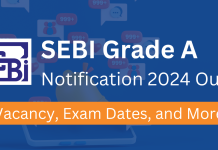The anticipation for this prestigious examination is palpable as the RBI Grade B notification for 2024 looms on the horizon. Renowned for its substantial perks, allowances, and incentives, the RBI Grade B post is a coveted dream for many candidates, ranging from recent graduates to seasoned professionals across diverse fields.
Despite its allure, the exam is relatively new and yet to attain its deserved prominence among aspirants in the competitive exam landscape. Unfortunately, this unfamiliarity has led to the propagation of myths and misconceptions through the internet and social media, potentially denting the aspirations of prospective RBI Grade B Officers.
In this context, it becomes imperative for aspirants to dispel these myths and gain a comprehensive understanding of the exam’s intricacies before embarking on their preparation journey. This blog seeks to address and debunk five prevalent myths, providing aspirants with vital reality checks to navigate the RBI Grade B exam landscape with clarity and strategic preparation. As candidates often doubt this highly sought-after examination, this discussion aims to empower them with accurate information and insights, ensuring they approach their preparation confidently and precisely.
To succeed in the RBI Grade B exam, aspirants must not only master the syllabus but also navigate the plethora of information available. With the increasing popularity of competitive exams, there’s a surge in myths surrounding them, leading to confusion. The forthcoming paragraphs delve into specific myths that have surfaced regarding the RBI Grade B exam. By debunking these misconceptions and offering clarity on the examination’s true nature, this blog aims to guide aspirants toward a focused and effective preparation strategy. Let’s unravel the realities behind the myths and equip candidates with the knowledge needed to pursue success in the RBI Grade B examination.

RBI Grade B Exam Eligibility Criteria
Understanding the eligibility criteria is crucial to crack the RBI Grade B 2024 exam. While the official criteria 2024 are pending, insights from the 2023 notification are valuable. A Graduate Degree is a prerequisite, and candidates must fall within the age range of 21 to 30 years, with specific age relaxations for reserved categories. Examining the RBI Grade B eligibility criteria provides a blueprint for evaluating your eligibility. Stay attuned to the official notification for 2024 to ensure accurate and updated information, securing your eligibility to apply for the RBI Grade B exam.
| Educational Criteria | Graduation in any discipline /Equivalent technical or professional qualification with minimum 60% marks (50% for SC/ST/PwBD applicants) |
| Age Criteria | Minimum-21 Years / Maximum-30 Years |
| Age Relaxation | Minimum-3 Years / Maximum-13 Years |
RBI Grade B Exam Pattern
Prepare for the upcoming RBI Grade B 2024 exam by delving into the intricacies outlined in the previous year’s notification. The RBI Grade B Exam Pattern is pivotal in your preparation, guiding you in formulating a well-structured strategy. Phase 1 (Prelims) is objective, bilingual, and spans 2 hours, assessing 200 marks. Phase 2 (Mains) comprises three papers: Paper 1 is objective and descriptive for 100 marks, Paper 2 focuses on writing skills with 100 marks, and Paper 3 is objective and descriptive for 100 marks, all within varying durations. The final phase, Phase 3 (Interview), holds a weightage of 75 marks. This insight into the exam structure guides aspirants in formulating a targeted and effective preparation strategy.
As you gear up for the RBI Grade B 2024 exam, stay attuned to the RBI Grade B Notification for the latest updates. The notification holds vital information that may influence your preparation strategy. Be proactive in tracking any changes, ensuring that your approach aligns seamlessly with the evolving requirements of the RBI Grade B Exam. This awareness of the notification details enhances your preparedness, giving you a competitive edge in tackling the challenges posed by the RBI Grade B examination. The RBI Grade B exam pattern is provided in the table below.
| Phases | Exam Type | Marks | Duration | Exam Language |
| Phase 1 (Prelims) | Objective | 200 marks | 2 hours | Bilingual (Except the test for English language.) |
| Phase 2 (Mains) | Paper 1 (Objective & Descriptive) | 100 marks | 30 minutes (Objective) & 1 hour 30 minutes (Descriptive) | |
| Paper 2 (Writing Skills) | 100 marks | 1 hour 30 minutes | ||
| Paper 3 (Objective & Descriptive) | 100 marks | Composite time of 2 hours | ||
| Phase 3 (Interview) | Interview | 75 marks | ||
RBI Grade B Exam Syllabus
In preparation for the RBI Grade B Exam 2024, aspirants should concentrate on four essential subjects: General Awareness, English Language, Reasoning, and Numerical Ability. A comprehensive grasp of the entire RBI Grade B exam syllabus for Phase 1 is imperative for success. General awareness, a pivotal component, can be efficiently covered using BeePedia, an all-encompassing resource that caters to content requirements for exams conducted by regulatory bodies such as RBI, NABARD, and SEBI. BeePedia serves as a one-stop solution, eliminating the need to consult multiple sources for general awareness content.
Transitioning to the RBI Grade B Mains Exam 2024, this phase holds critical significance for candidates who have surpassed the predetermined Prelims cut-off. The selective approach ensures that only the most qualified individuals progress to the Mains phase. The Mains Exam pattern comprises three papers: Economics and Social Issues, Descriptive English, and Finance Management. This multifaceted evaluation process incorporates both objective and descriptive components, offering depth and breadth to the assessment criteria. Aspirants must navigate this comprehensive structure to secure success in the RBI Grade B examination and advance toward the coveted position in the banking sector. For a detailed understanding of the topics to focus on, refer to the RBI Grade B Exam Syllabus 2024 outlined in the table below.
| RBI Grade B Prelims Syllabus | |
| Subject | Topics |
| Quantitative Aptitude | Simplification and approximation, Number Series, Quadratic Equation, Number System / HCF & LCM, Ratio and Proportion, Average, Partnership, Ages, Percentage, Profit & Loss, Time, Speed & Distance, Problems on Trains, Boat and Stream, Time & Work / Pipes and Cisterns, Simple and Compound Interest, Mixture & Allegations, Permutation and Combination, Probability, Data Interpretation (DI), Caselet DI and Data Sufficiency |
| English | Grammar, Vocabulary, Reading Comprehension, Passage Making, Error Spotting, Jumble Words, Sentence Framing, Fill in the blanks |
| General Awareness | Monetary Policies, Banking and Financial Awareness, Economic Terms, Current Affairs (BeePedia), Static GK, Financial and Economic News, Government Schemes. Agreement & Deals, Banking Terms- rates & processes, National Institutions |
| Reasoning | Puzzles, Seating Arrangement- Circular, Square & Linear, Data Sufficiency, Directions and Distance, Coding-Decoding, Blood relations, Inequality, Syllogism, Machine input and output, Verbal Reasoning, Ordering and Ranking, Arrangement and Pattern, Scheduling, Distance and Direction, Ranking |
| RBI Grade B Economic and Social Issues (ESI) Syllabus | |
| Topics | Sub-Topics |
| Growth and Development | Measurement of growth: National Income and per capita income – Poverty Alleviation and Employment Generation in India – Sustainable Development and Environmental issues. |
| Indian Economy | Economic History of India – Changes in Industrial and Labour Policy, Monetary and Fiscal Policy since reforms of 1991 – Priorities and recommendations of Economic Survey and Union Budget – Indian Money and Financial Markets: Linkages with the economy – Role of Indian banks and Reserve Bank in the development process – Public Finance – Political Economy – Industrial Developments in India- Indian Agriculture – Services sector in India. |
| Globalization | Opening up of the Indian Economy – Balance of Payments, Export-Import Policy – International Economic Institutions – IMF and World Bank – WTO – Regional Economic Cooperation; International Economic Issues. |
| Social Structure in India | Multiculturalism – Demographic Trends – Urbanisation and Migration – Gender Issues – Social Justice. |
RBI Grade B Myths and Facts
Embark on a journey to unravel the truths and debunk the myths surrounding the RBI Grade B examination. In this exploration, discover crucial insights that dispel misconceptions, providing aspiring candidates with a clearer understanding of the exam’s nuances. Uncover the realities that shape effective preparation strategies and challenge common myths, guiding you to success in the RBI Grade B examination. With ixambee’s RBI Grade B Online Course, aspirants can prepare for the exam more intricately.
- Time Required for Preparation: In the evolving landscape of the RBI Grade B exam, the paradigm of preparation has shifted significantly. Gone are the days when candidates could afford a relatively brief 3-4 months window to prepare themselves for this challenging examination. The Quantitative and Reasoning segments pose formidable challenges, requiring aspirants to delve into intense, sustained practice. Subjects like Quantitative Aptitude and Reasoning necessitate a more extended timeframe, at least 6-8 months, for candidates to acquire the proficiency essential for clearing the initial stages of the examination. The RBI Grade B exam’s contemporary intricacies warrant a paradigm shift in aspirants’ preparation timelines. A more protracted and focused approach, spanning at least 6-8 months, has become imperative to navigate the evolving challenges posed by the heightened difficulty levels and the multifaceted demands of the examination.
- Myth of Commerce Background Advantage: Contrary to common perception, a Commerce background is not a prerequisite for success in the RBI Grade B exam. The official notification underscores the need for a “General Finance and Management” understanding, emphasizing the adequacy of a basic grasp of these subjects. Diligent preparation empowers candidates from non-Commerce backgrounds to stand on equal footing with their counterparts, dispelling the notion that specialized prior knowledge is essential. This inclusive approach ensures that aspirants, regardless of their educational background, can strive for success through focused and comprehensive exam preparation.
- Impact of Answer-Writing Practice: Navigating through the Descriptive sections of exams can pose an initial challenge, but consistent practice in answer writing proves transformative—the experiences of toppers underscore the pivotal role of strategic answer-writing practice in achieving success. ixambee’s RBI Grade B Mock Tests and RBI Grade B Previous Year Papers will be helpful for candidates preparing for the exam. While grappling with the intricacies of descriptive portions may seem daunting initially, a disciplined approach to honing this skill can yield significant dividends. As evidenced by successful candidates, investing time and effort in regular answer-writing practice contributes substantially to mastering the art and science of responding effectively to descriptive questions, ultimately enhancing one’s performance in competitive exams.
- No Preference for Working Professionals: Addressing a prevalent worry, it is essential to clarify that during RBI Grade B interviews, panelists do not exhibit a bias towards working or non-working candidates. The selection criteria revolve around knowledge, personality, confidence, and analytical abilities. The professional background of a candidate holds no precedence over these critical attributes, emphasizing that the interview process is impartial and focuses solely on the individual’s merit. Therefore, aspirants should channel their efforts into cultivating and showcasing these qualities, reassuring them that their chances of success are contingent on personal attributes rather than professional status.
- Sufficient Preparation Time for Working Professionals: For working professionals aspiring to crack the RBI Grade B exam, success lies in strategic time allocation—committing 4-5 hours daily over a span of 6-8 months. The key is to prioritize schedules, make time for study during early mornings and evenings, and even utilize lunch breaks for revision. Consistency is paramount, and a focused approach ensures comprehensive coverage of the extensive syllabus. By adhering to this routine, working professionals can balance their professional commitments effectively while securing ample preparation time for the RBI Grade B examination.
- Educational Background Misconceptions: Contrary to common assumptions, being an IIT or IIM graduate is not a prerequisite for the RBI Grade B exam. The minimum requirement is a 60% graduation score, opening the door for Arts and Commerce graduates. Numerous instances attest to the success of candidates from diverse educational backgrounds, dispelling the notion that specialized degrees are mandatory. With a year of focused preparation, Arts and Commerce graduates have met and excelled in the requirements, highlighting that dedication and adherence to the exam syllabus are critical to success.
- Generalist Nature of RBI Grade B Officer: The role of an RBI Grade B Officer is that of a generalist rather than a specialist, necessitating a broad understanding of economic and social issues rather than a deep expertise in economics. While associated with the RBI, the position does not demand specialized knowledge in economics. The exam syllabus emphasizes Economic and Social Issues, encouraging candidates to grasp broader issues and fundamental concepts in banking and finance. Aspiring candidates need not be specialists but should focus on cultivating a holistic understanding of the economic landscape and its social implications to excel in the RBI Grade B examination.
- Reading Numerous Books Not Mandatory: While RBI provides a list of recommended books in the syllabus, attempting to read all of them may be impractical. Instead, a practical approach involves daily reading of newspapers to stay informed about current affairs and enhance comprehension of finance concepts. This strategy lets candidates stay updated on relevant economic and social issues, a crucial aspect of RBI Grade B exam preparation. By focusing on real-world scenarios and timely information, candidates can build a solid foundation for tackling the exam’s challenges effectively.
- Realistic Time Frame for Exam Preparation: Achieving success in the RBI Grade B exam within 3 months is an impractical expectation for most candidates. Building a robust foundation demands a more extended preparation period, typically around a year. This comprehensive timeframe allows aspirants to delve into quantitative aptitude, reasoning, English, economic and social issues, finance, and management. Candidates need adequate time for understanding, practice, and revision to establish a firm grasp of these diverse topics. While a focused revision might be achievable in 3 months, the initial groundwork requires a more realistic and extended commitment.
- Hindi Medium Option: Contrary to common misconceptions, the RBI Grade B exam can indeed be attempted in Hindi. While the availability of Hindi resources may be relatively limited, it is feasible to undertake quality preparation in the Hindi medium. Almost all sections of the exam, except for English, allow candidates to choose Hindi as the examination language. As the Central government promotes Hindi as a primary language, candidates should not face any hindrance in attempting the RBI Grade B exam in Hindi. The key lies in identifying and utilizing high-quality Hindi resources for effective and targeted preparation.
- Descriptive Section Misconceptions: The apprehension regarding the word limit in the descriptive section of the RBI Grade B exam is unfounded. Many candidates worry about typing a specific number of words within the allocated time, fearing that fewer words might result in lower marks. However, it’s crucial to understand that the word limit is merely a reference to guide candidates in structuring their answers. In reality, the emphasis is on the quality of content rather than the quantity of words. Successful candidates have demonstrated that thoughtful and concise responses can lead to excellent outcomes even if they fall short of the suggested word count. The key takeaway is that quality precedes quantity in the descriptive section in the RBI Grade B exam.
- RBI Grade B as “Mini UPSC” Misconception: Success in the RBI Grade B exam hinges on a meticulously crafted plan encompassing all topics outlined in the syllabus. A crucial aspect of this strategy involves extensive practice, including regular mock tests. Contrary to the belief that multiple attempts are necessary, clearing the exam in the first attempt is achievable with thorough and comprehensive preparation. Aspirants should focus on understanding the intricacies of each subject, practicing consistently, and staying updated with relevant information. A well-rounded approach that combines theoretical knowledge with practical application significantly enhances the chances of success in the RBI Grade B examination.
Summing Up
Demystifying the RBI Grade B exam is essential for aspiring candidates. This comprehensive exploration has debunked prevalent myths, offering clarity on eligibility, preparation timelines, and exam nuances. Armed with accurate information, candidates can navigate their preparation journey strategically, embracing the challenges and aiming for success. The RBI Grade B examination is not just an academic pursuit; it’s a journey of preparation, dedication, and resilience, and with the right approach, aspirants can realize their dream of becoming RBI Grade B Officers.
To help you prepare 50% faster for competitive exams, ixamBee provides a free Mock Test Series and all the Current Affairs in English and Current Affairs in Hindi in the BeePedia capsules for GA Preparation. You can also get the latest updates for Bank PO, Bank Clerk, SSC, RBI Grade B, NABARD, and Other Government Jobs.
Also Read
RBI Grade B: Winning Strategy Part 1
Prepare for RBI Grade B Exam 2024 with the best books
Mistakes to Avoid in RBI Grade B 2024 Preparation














